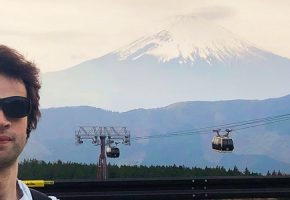Time in Japan
While cities like Tokyo and Kyoto offer undeniable charm, truly making your Working Holiday in Japan unforgettable means exploring beyond just the major tourist spots. This gives you the chance to see beautiful nature and historical buildings, meet locals, and really immerse yourself in Japanese culture. One place truly worth a visit is Sado Island, a hidden gem in Niigata Prefecture. Sado Island - Why It’s Worth a Visit Sado Island, Japan's sixth-largest island, is a microcosm of the country itself, boasting diverse landscapes from picturesque beaches and cascading rice paddies to rugged mountain roads. Known for its clear waters, rocky shores, and abundant marine life, Sado offers fantastic opportunities for outdoor activities like hiking and swimming. It also is home to five sake breweries, so why not try some sake while you are there? Beyond its natural beauty, Sado is a hub of traditional culture. It's home to the Kodo Taiko Ensemble, which hosts the annual Earth Celebration Festival. The music festival is a dynamic event of drumming and cultural exchange. Visitors can also try taiko drumming themselves at the Sado Island Taiko Center. Unique experiences like riding a "tarai bune" (a traditional tub-boat) or exploring historic villages like Shukunegi, with its preserved wooden houses, offer a glimpse into the island's rich heritage. Additionally, the Sado Gold Mine, a UNESCO World Heritage site, is a significant historical attraction that offers a fascinating look into the island's past as a major mining center. The island is also a crucial site for the reintroduction of the Japanese Crested Ibis, a species that was once almost extinct in the wild but now thrives on Sado thanks to conservation efforts. A Short History of Sado Island Sado Island has a fascinating and at times tumultuous history, serving for centuries as a place of exile for political figures and intellectuals. The island experienced a significant boom with the discovery of gold and silver mines in the 17th century, which helped finance the Tokugawa shogunate. The Sado Gold Mine, now a UNESCO World Heritage site, attracted people from all over Japan, leading to a sudden rise in population and enriching its cultural diversity. However, nowadays Sado faces a shrinking and aging population, like many areas in Japan. Furthermore, while Sado used to be a popular tourist destination, due to the rise of cheap overseas flights, the tourist numbers have halved. As a result abandoned buildings and even entire villages now dot Sado’s landscape. Historical buildings, including vital temples, are deteriorating. Many of the island's monks, often elderly, struggle to find successors, leading to a profound loss of invaluable cultural heritage. A Unique and Innovative Cooperation Amidst these struggles, new innovative ideas emerged. One of them is the cooperation between World Unite! and Chokokuji Temple. The historic Chokokuji Temple is one of Sado's largest and most significant temples, founded by Kobo Daishi (Kukai) in 807. It is designed to resemble Nara's Hasedera Temple, is not only a spiritual site but also a custodian of cultural assets, including ancient Kannon statues and Heian Period guardian figures. These eleven-headed Kannon statues and only unveiled to the public once every 33 years, with the next viewing set for 2034. Beyond the buildings, the temple grounds are home to three ancient cedar trees, estimated to be over 1,000 years old, believed to hold spiritual power. Recognizing the challenges faced by historical structures like Chokokuji in an aging society, World Unite! is using the temple as a base for an Environment conservation camp. The volunteers support the 87-year-old monk and his wife with the temple's preservation and development. A portion of the program fees directly contributes to the temple’s upkeep, and proceeds from a souvenir shop within the temple, launched in 2024, also go directly to Chokokuji Temple. This unique model helps ensure the temple's future while providing volunteers with an authentic immersion into Japanese culture and temple life. The Mother Nature Environmental Conservation Camp This camp, called “Mother Nature Environmental Conservation Camp Sado Island”, provides a deeply enriching experience for travellers looking to contribute to local life and explore Japan beyond the mainstream path. Participants live in large, fully furnished tents on the grounds of Chokokuji Temple and engage in a variety of activities: Besides temple preservation, the participants also contribute to the conversation of the Japanese Crested Ibis. After World War II, the use of chemical pesticides became widespread. The poisons decimated the Ibi’s food sources to such an extent that in 2003, the bird was considered "extinct in the wild." A government breeding program saved the last captive specimens and successfully began reintroducing offspring into the wild. For the species to survive in the wild, traditional, pesticide-free rice fields and irrigated, fallow Satoyama areas are urgently needed today. Volunteers from World Unite! therefore work together with local rice farmers to promote precisely these traditional farming methods, irrigate unused fields, and thus permanently secure the toki's habitat. Furthermore, in this camp you can participate in beach cleanups and learn how to use bamboo to make sustainable and traditional crafts. You will learn about herbal medicine and engage with local school children by teaching them about environmental protection. Regularly, World Unite! also organizes the participation in workshops on traditional and local culture such as building a traditional reed boat. This program offers a unique blend of cultural immersion, environmental contribution, and personal growth, making it a truly distinctive Japanese adventure. Do You Want to Know More? Does this sound interesting, and would you like to know more? Then check out the projects page:https://www.world-unite.de/en/internships-volunteering/japan/environmental-conservation-cultural-heritage-templestay-sado If you would like to receive support with organizing your Working Holiday, visit the World Unite! webpage at:https://www.world-unite.de/en/working-holiday/japan/work-and-travel-tokyo-kyoto
Do you dream of carving fresh tracks in legendary powder snow while experiencing vibrant Japanese culture? People from all over the world come to experience the “Japow” - the famous, light powder snow of Japan. Australians and US Americans make up the biggest share of international visitors. Therefore, Japanese language skills are not necessarily required to work at a ski resort. However, it will make finding a job easier as Japanese nationals also love to ski in their home country. Working at a ski resort in Japan on a Working Holiday Visa offers a unique blend of adventure, cultural immersion, and practical work experience. This opportunity allows you to live and work in breathtaking winter landscapes and connect with people from around the globe. World Unite! can pre-arrange a job at a ski resort for you if you are planning to be in Japan during the winter season. Our partners are located in prime winter destinations across Hokkaido, Niigata, and Iwate prefectures. The winter season in Japan typically runs from late November or early December to the end of March, and you are expected to be available for the entire season. Do you need to speak Japanese? Not always! There are English-speaking positions, yet they are limited. Japanese language skills will definitely enhance your experience and chances of securing certain roles. If you want to learn Japanese from scratch or freshen up your skills, you can also book one of our language classes in Tokyo beforehand. So, what kind of work will you be doing? You'll find a variety of roles to suit your skills and interests: Ski & Snowboard Instruction: If you have solid snowboarding and skiing skills, you can work as a ski instructor assistant or children's ski instructor. Instructor experience itself is not necessary. Hotel Hospitality: Many resorts also seek staff for essential hospitality positions, including front desk/reception, housekeeping, room service, laundry, onsen cleaner/attendant, and luggage handling. Restaurant & Food Service: Roles such as kitchen assistant, dishwasher, and waiter/waitress are also common. These are full-time positions, where you should expect to work around 40 hours per week. While wages vary by role and prefecture, the hourly rate typically ranges between ¥800-¥1,200. Combined with subsidized living costs, this ensures you can comfortably cover your expenses and enjoy your time. How, and where will you live? While accommodation costs apply, they are subsidized by your employer, making your working holiday more affordable. The specifics vary by resort. For instance, one resort offers a shared twin room for as little as ¥5,000 per month, while others might provide a dormitory bed for free, with an upgrade option. Beyond just affordable housing, you'll often receive additional benefits. These could include subsidized meals and, perhaps the best perk of all, free ski passes! This means endless opportunities to hit the slopes during your time off, making the most of Japan's legendary powder.

When you book our Working Holiday support program in Japan, you can choose to start in either Kyoto or Tokyo. At both locations, we operate our own sharehouse accommodation and support office. About our new Kyoto sharehouse Our new Kyoto sharehouse offers a comfortable, convenient base in Fushimi, with our support office located in the same building—just like in Tokyo. This setup makes it easy for you to reach us in person if you stay in one of the dorm or twin bedrooms in our sharehouses. At our offices, we provide introductions and job support. During office hours (Monday-Friday), you’re welcome to stop by for any assistance you need. We also offer a dedicated area with a PC and printer for job research and resume printing. Our Working Holiday support services in Kyoto and Tokyo assist you with: 👉️ Visa application process👉️ Travel planning and preparation👉️ Job finding in Japan👉️ Formalities such as Residence Registration, Tax Number Application, Health System Registration, Pension Exemption, Bank Account Setup, and Phone Contract Assistance👉️ Accommodation in Japan👉️ Japanese language lessons👉️ Socializing with Japanese individuals and other foreign travelers We also offer a monthly language exchange with locals, giving you the chance to practice your Japanese skills and connect with Japanese people. Additionally, we can arrange Working Holiday jobs at farms, traditional Japanese hotels (ryokans) across various cities and regions in Japan (for those with basic Japanese skills), ski resorts, and on Sado Island (agriculture, fishing, tourism) prior to your arrival. We also offer placements for babysitting and for positions as English and French assistant teachers at public schools. Contact us for more details about babysitting and assistant language teacher jobs. Our pre-arranged job packages include all support services in Tokyo or Kyoto, allowing you to fully experience Japan in all its diversity! What are you waiting for? Working Holiday start dates in Kyoto are once a month—come join us! 😃👉️ You can easily book your Working Holiday in Japan through our website:BOOK YOUR WORKING HOLIDAY IN JAPAN HERE!

World Unite! has launched an intensive Japanese conversation language course tailored specifically to the needs of those arriving in Japan on a Working Holiday visa. The aim is to enhance listening comprehension, speaking skills, and basic reading skills as rapidly as possible. Beginners can commence the course once per month and are welcome to participate for any duration ranging from 1 to 8 weeks, with rates that are very affordable. We spoke with the lead language instructor, Megumi Taguchi, who also developed the educational materials, to learn more about the course. Who is the course designed for? The course is tailored to meet the needs of foreigners arriving in Japan on a Working Holiday visa. For them, possessing basic conversational Japanese skills can significantly broaden job prospects and income opportunities, enabling effective communication with Japanese customers or colleagues. They require rapid language acquisition and skills relevant to their circumstances. Additionally, individuals undertaking internships with Japanese companies or engaging in volunteer work in Japan can greatly benefit from the Japanese conversation skills acquired through this course. Given that we offer flexible enrollment options starting from just one week and do not impose costly registration fees, we also warmly welcome tourists or travelers interested in learning the Japanese language. What aspects of the course do students most appreciate? My students often expressed that the textbook structure was the most effective aspect of the course. They found it clear and understandable, allowing them to grasp the rules and independently construct sentences and conjugate forms. Moreover, they appreciated the additional homework and practice sheets customized to their individual needs, as it enabled them to focus on areas for improvement in their Japanese skills. Could you please provide a brief overview of the course content? The course offers fast-paced and intensive learning experiences beneficial for students' daily lives. Students can book lessons from 1 to 8-week durations. If you are not a total beginner, but you already know a little, you can join a course after it has started. A placement test is available to ensure the appropriate level. During the initial 2 weeks, students will acquire an understanding of basic Japanese sentence structure and word order. Each day, we will also be learning hiragana, with one column covered per day. During weeks 3 and 4, you will acquire proficiency in various Japanese linguistic elements, including past tense, formal forms, continuous forms, te-forms, imperative forms, conditional statements (if, when, even though), causation, subjective and objective expressions, comparison, and interrogative sentence structures. Each day, we will also be learning katakana letters, with one column covered per day. During weeks 5-8, you will have thorough review and practice sessions covering all previously learned forms, as well as opportunities to enhance your speaking and listening abilities. Furthermore, you will acquire proficiency in using a more formal speaking style enriched with advanced vocabulary, which is essential for working in Japan. Can you share a bit about your background and experience? With 2 years of experience teaching Japanese across 11 countries, I have taught in US colleges, Japan, and online platforms. I am enthusiastic about implementing innovative teaching methods, such as creating my own textbook. My textbook is developed based on various feedback from my students. For example, I identify the most challenging aspects of learning Japanese from my students and strive to provide clear explanations of Japanese rules and systems in English. This approach helps students grasp concepts more rapidly and comprehensively. Additionally, clarifying the differences between English and Japanese structures and expressions enhances students' understanding of the Japanese language. What other options do students of this course have to improve their Japanese? At no extra charge, we offer language exchange events twice a month and a social meetup once a month, fostering friendships and conversation partnerships. Our cultural events, which come at a little extra cost, provide a deeper understanding of Japanese history and culture, offering diverse perspectives to enhance your learning experiences. Students seeking higher proficiency levels after completing the 8-week course can access other schools that we cooperate with and continue their learning journey. Thank you, Megumi for your insights! 😃 You can book the lessons via World Unite! Japan KK: BOOK LESSONS HERE!
Cooking course, language lessons and culinary internship in Japan If you are a fan of Japanese cuisine and want to get to know it first hand and in depth, this program is just right for you! You will spend the first month in Tokyo, taking part in a cooking course and in Japanese language lessons. You can decide whether you prefer to stay with a Japanese host family or, more affordably and independently, in a sharehouse (self-catering). The basic Japanese language skills that you acquire through the participation in the language course is required for the second part of your stay in Japan - the restaurant internship on rural Sado Island. Additionally, you can book a 4-week Japanese culinary vocabulary course with 2 sessions of 45 minutes per week, where you will specifically learn Japanese culinary terms. You will then spend the second and third month on Sado Island on the west coast of central Japan in Niigata Prefecture. Sado is a picturesque island with a strong local culture and is also particularly known for local seafood specialties (shrimp, crabs, squid, fish, oysters, abaolone and turban shellfish) as well as seaweed such as wakame, mozuku and iwanori, shiitake mushrooms, traditionally grown rice and persimmons. Sado has several producers of sake, igoneri (seaweed jelly), meat products and other local specialties. Many domestic Japanese tourists travel to Sado for culinary experiences. You will do an internship in a typical Japanese restaurant that specializes in yakitori, ramen, sushi, gyoza or other Japanese or local specialities. There are also two culinary day visits included in the program. You will live in an apartment or in a temple's guesthouse, depending on the location of your internship restaurant. START DATES 2025: October 31 and November 28 2026: January 2, January 30, February 27, March 27, June 5, July 3, September 4, October 2, October 30 and November 27 BOOK NOW! ITINERARY Day 1 - 3 Arrival in Japan, accompanied pick-up from Narita or Haneda airport by public transport and escort to your accommodation (you can choose between a Japanese host family including breakfast and dinner, accommodation in a single room) or a sharehouse (accommodation in a 4-8-share dorm room together with other foreign interns). Saturday and Sunday at leisure. Day 4 - 28 Monday to Friday you will join our intensive language lessons from 9:10 to 12:40 (a total of 20 lessons x 50 minutes/week). You can join the course as a beginner, but also at other levels if you already know some Japanese. You need to do a proficiency test if you want to start the course at a higher level than beginner (available up to upper intermediate). Additionally, you will get 2x45 minutes of lessons per week in "Culinary Japanese", including cuisine-related vocabulary and useful expressions for your internship at a Japanese restaurant kitchen. The cooking classes are held 8 times. The English-speaking cooking teacher is a professional chef. Class 1: Japanese food basics The 5 taste concepts (sweetness, saltiness, acidity, bitterness, umami). The 5 colours: red, green, yellow, white, black The 5 methods: bake, simmer, fry, steam, raw Chopstick manners and basics of serving meals Cooking: Grilled fish, steamed egg custard, Japanese mustard spinach with sesame sauce, pork miso soup, white rice Class 2: Easy Japanese dining table setup with rice pot cooking Oyakodon, mizuna and jako salad, instant radish pickles, tofu and shiitake mushroom miso soup. Class 3: Colorful bento with five colors Fried chicken, boiled hijiki, tamagoyaki, boiled spinach, kinpira burdock root, white rice bento Class 4: The concept of "Sashisuseso" Nabe-daki rice, mackerel simmered in miso, meat and potatoes, vinegared seaweed, ginger and cucumber, miso soup Class 5: The role of seasonings in Japanese food and how to make dashi Mixed rice or sekihan, boiled in Chikuzen, horse mackerel pickled in Nanban, clear soup Class 6: Japanese sweets 1 Mizuyokan Class 7: Japanese Sweets 2 Kingyoku and Nerikiri Class 8: Other Japanese dishes Cutlet curry rice and Japanese potato salad or Dumplings and Hiyashi Chuka (Cold Ramen) Accommodation is with your host family (including breakfast and dinner during weekdays and including 3 meals on Saturday and Sunday) or in a sharehouse (shared, self-catering accommodation). The host families mostly live in Saitama, Chiba, Yokohama or in the west of Tokyo. The sharehouse is located in Koto-Ku near Kiba Station. Not included in the price: Commuter ticket for local public transport in Tokyo (between your accommodation and the language school and cooking school; approx. 6500-10,000 JPY for the entire duration). Day 29 & 30 Travel from Tokyo to Sado Island by Shinkansen bullet train and ferry (total travel time approx. 5 hours). You pay for the train and ferry costs yourself, around 14,000 JPY. We will pick you up from the Sado Ferry Terminal (Ryotsu) and drive you to your accommodation on Sado. Accommodation is chosen depending on the location of the restaurant where you would do your internship. In case of the central Sado and Ryotsu area, you will stay at a self-catering rental apartment, single room. The apartment are two-room apartments where you will share kitchen, toilet and bathroom with another participant of the program. In case of a restaurant in the Ogi area of Sado, you will stay at the guesthouse of Chokokuji Temple at a single bedroom, sharing sanitary installations and kitchen with other participants. In case your accommodation and restaurant is in the central Sado or Ryotsu area, you can reach your restaurant by walk, bus (communiting costs at your own expense) or bicycle (provided to you free of charge if needed). In case of the Ogi area, you reach your internship restaurant by bicycle (provided free of charge). Days 31 - 89 You will do your restaurant internship. You will be in the restaurant 4-5 days a week for 4-8 hours each as an assistant to the local chefs. Japanese restaurants typically only prepare one type of food, so the restaurant where you will do your internship will most likely specialize in one certain type of food only such as Yakitori, Ramen, Sushi or Gyozo. Once a month there is a full day trip (included in the price). The date will be decided depending on the availability of all internship participants. First month: Natural herbs collection in the forest and visit to/workshop in a herbal tea factory Second month: Traditional rice cultivation / harvest (depending on season) Accommodation at your apartment room or at Chokokuji Temple. Day 90 Transfer to Ryotsu Ferry Port in Sado and return travel to Tokyo (at your own expense) for your outbound flight (visa validity for most nationalities is 90 days, so please make sure to book your return flight accordingly) You can do this program on a Temporary Visitor Status or Tourist Visa (or other long-term visas for Japan that you might arrange on your own). If you are unsure about possible visa options for your nationality, please consult with WORLD UNITE! before booking the program. RATES For 1 person: 2980 USD For 2 persons: 2880 USD for each Host family accommodation (for 30 days): +769 USD Japanese culinary vocabulary course: 140 USD Do you want to join this Culinary Internship? Contact us now!
I went on a trip to Hakone and bought the Free Pass which gave me unlimited access to a range of different modes of transport as well as a round trip back to Shinjuku. The first stop was the Open Air Museum which features all kinds of quirky art structures but the highlight was definitely the symphonic structure that is grey and plain on the inside but a wall of colour within. The Hakone ropeway is a popular form of transportation in Hakone. This mode of transport is entirely free with the Hakone free pass. However, this is more than just a means of getting from A to B (which it does a very good job in taking you to lake Ashi) as it is an experience in its own right. One moment you are sailing above the trees and the next you are over the top of the mountain ridge and looking at the face of a volcano. Also, if you go on a clear day like I did then Mount Fuji is visible enough to snatch a photo of. Immediately after getting off the ropeway you are deposited at the shores of lake Ashi where a pirate ship awaits and at times like this it genuinely felt like the halogen area was one big sightseeing assault course with tourists carried along by the different and contrasting modes of transport as if they were on a conveyor belt. In truth I didn’t think the boat ride was that impressive, in fact it was the opposite of the symphonic structure in the Hakone Open Air Museum in that it was grand on the outside but ordinary within. In fact, I was more interested in speaking with some Canadians I met than I was in the boat ride and we discussed our Japan travel experiences at length. At the end of the boat ride I had the choice to go to Hakone shrine to the north or Mishima skywalk to the south and I decided to go with the latter as it was the path less travelled. I arrived at sunset and there were views of a sunset, suspension bridge, Sakura and Mount Fuji all at once. It was raining on the second day in Hakone (and a second day is necessary if you want to see the majority of what is on offer in the area) so I went for an activity that didn’t require good weather, the Hakone Glass Museum. When I arrived it didn’t feel like much of a museum at all but rather a quaint, fancy garden with many of the trees and bushes replaced by glass. While the individual exhibits weren’t jaw dropping, but like many of the other things they came together to create a mystical and peaceful atmosphere where you could sit and relax without overwhelming hordes of tourists which made a nice change from bouncing from one tourist hotspot to another. The most underrated attraction in the Hakone area by far was Tamadare falls. So underrated that it doesn’t even feature on the area map you get with the Hakone free pass (you need Hakone Yumoto station, OH51). In fact the only reason I knew about it was because the other English person who arrived at the sharehouse the same time as me went there and I saw their pictures on Instagram. I am glad I decided to be a copycat as it was one of my favourite places. The statues of dragons spitting water, the koi fish, the crimson-leaved trees and of course the waterfall with a pond complete with stepping stones made for some really good scenery. Also, because this area is relatively off the grid you also could still feel the atmosphere of the place as it wasn’t drowned out by crowds of tourists. I was in no particular rush to head back to Tokyo and I had seen everything I wanted to see so I decided to stop by Odawara castle. I arrived at about a quarter to 5 so there was little point in me paying to go inside the castle if it was going to close in 15 minutes. However, that didn’t mean the trip was wasted at all, the castle grounds and walls on the outside were more than sufficient to get a feel of the place and get some good photos in the process. Report by our participant Jacob
Hokkaido My first day's trip at Shiretoko National Park was split into three parts: snow shoes walking to see nature in the forest, drift ice walking on the frozen sea of Othosk and animal and coastal views at sunset. Moved a little south down the eastern side of Hokkaido. Originally I had intended to go to lake Mashū but the road was blocked so I went to Mount Iō instead and then the town of Kawayuonsen which had a nature trail with deer running free (which was quite a surprise as the trail I got first wasn’t on any map). I visited the Akan Crane Center for day 3. Unfortunately I narrowly missed the bus in the morning and had to wait over 4 hours in Kushiro for the next bus, by which time the cranes were almost all gone, but I could still get the odd decent pic of them. Public transport in Hokkaido is far worse than that in Tokyo and you really need to have things planned out and get up really early at times. I left the east of the island behind and headed for the heart of Hokkaido. This involved a train across the island which passed through endless fields of snow. Since there was heavy sleet and snow that day, I decided to make it a day. I went to see the zoo in Asahikawa where a range of different species from the world’s coldest climates could be found. In the evening I returned to Furano where I was based and walked along Ningle Terrace which is an arts and craft shopping area made entirely of wooden cabins in a forest illuminated by fairy lights. The 5th day got off to a rather bad start as the main purpose of my trip to the Shirogane area, near the town of Biei (within an hour of Furano) was to see the blue pond. However, at this time of the year (March) the pond is frozen over and covered with snow, so barely to be seen. I then headed to Shirogane Falls but enroute I found a gap in the snow drift that went into the trees and I found the relatively well concealed Fudou falls, which has a very uncanny resemblance to a stone staircase. Continuing along the road through the whitewashed landscape I reached Shirogane Falls and was pleasantly surprised to find the blue colour of the water was alive and well here after all. The water was so clear you could see the stones of the river bed even from up high on the suspension bridge. On my 6th day, after a 3 hour bus ride from Furano to Sapporo I felt like the trip to Hokkaido had already ended as it felt like I had returned to Tokyo with a dusting of snow as I had left behind the mountains, ice floes and blue rivers and traded them in for them towers and shopping centres. However, in time I would come to learn that this was in many ways a different place to Tokyo as while it shared many of the conveniences, it did not suffer from the overcrowding the way Tokyo does. In fact I felt like I had a lot of room to roam free, and so I did. I came across many things including the tower, both day and night, an underground shopping centre with exotic birds, the Susukino entertainment district and a giant ferris wheel placed in the center of the main outdoor shopping arcade area. I didn’t have much energy left on the 7th and final day, in fact I didn’t leave the hotel room until exactly the last possible minute I could to check out. I spent the day going around looking at things within a striking distance of the city centre before getting the flight back to Tokyo from Sapporo late in the afternoon. I came across a fish market, a lacklustre clock tower, a pachinko slot arcade and the main outdoor shopping street/arcade. Japanese Alps For the first day on the trip to the Japanese alps I went to Nagano prefecture to see the snow monkeys. There was very little snow left in the middle of March but an abundance of monkeys could still be found. This area is famous for monkeys bathing in the onsen but it was too hot for that (although one did fall in) and they all seemed to gather around the onsen like holidaymakers in Spain gathering around the swimming pool on a sunny day. The thing about the monkey park is although it certainly feels very touristy you still get to have a ‘real’ experience of seeing the monkeys as they act as if nobody's watching, often passing by humans without stopping to look to go off and see other monkeys. In the morning of the 2nd day I went on an hour-long ride to the lowest level of the three tiered shrine complex of Togakushi. Togakushi is essentially a group of shrines that are scattered up the mountain at 3 points of different heights. The ascent to the top involves an increase in altitude of over 100 flights of stairs. I may have picked a bad time of year (March) to go as although it was spring at the bottom it was still very much winter at the top and the shrines were buried in snow to the point I nearly missed them entirely. There was also a tree corridor where half of it was missing as only the conifer trees had kept their leaves. The snow and cold climate caused further problems as the route to the mirror pond was blocked off so all things considered you should wait until at least at the end of spring to come. I returned to Nagano in the afternoon and spent sundown walking around Zenkō-ji. Practically having the temple to myself was a peaceful way to spend sundown on a spring evening. I also liked the atmosphere uphill road leading to the temple, especially at night where it is lit up by street lamps and the mountains cast a strong silhouette in the navy evening sky. At the halfway point of my trip in the Japanese alps I visited Matsumoto Castle, one of the most famous in Japan. In my opinion, the outside of the castle grounds actually looks better but the inside is still worth visiting at only 700JPY. On the inside you can go inside the castle (which feels more like a matchup between a multi-storey shrine and a museum than a typical castle). On the fourth day I went for a ride on the Shinhotaka Ropeway (which can be accessed by bus from both Matsumoto and Takayama). The ropeway barely gets a mention from the guidebooks and online travel blogs, making it the most criminally underrated attraction I have seen in Japan so far. The views at the top of the mountain range were amazing. However, when you come in the winter months there is another thing to see, a mini snow corridor as high as you are running through the trees. The only bad things about the trip are that it takes hours to reach by bus and it is one of the more expensive things to do. Nevertheless, it is still the most impressive sight I saw in the Japanese Alps region. The final part of my trip to the Japanese Alps region was visiting the UNESCO world heritage site of Shirakawa village. I have never been anywhere like it. Even to reach it you have to spend half an hour in darkness going through a mountain tunnel and when you emerge on the other side you arrive at a place composed entirely of thatched roof wooden buildings. When I was walking around the place in the drizzle I couldn’t help but think that it was very much like where I am from in the UK. Both are surrounded by green fields, both are in close proximity to the mountains and the biggest similarity of course being the incessant drizzle that was pouring that day. Report by our participant Jacob
Living in the Japanese countryside If during your Working Holiday in Japan you want to get to know the traditional Japanese countryside with people who have a strong sense of community and are deeply rooted in their traditions, try Sado Island. Sado, after the main islands of Hokkaido, Honshu, Kyushu, Shikoku and Okinawa, is Japan's six largest island. When gold was found on Sado Island in 1601, the island flourished economically and culturally, developing a unique and rich cultural heritage, including performing arts such as dance, chants and music, the world-famous Taiko drumming, puppet theater, folklore festivals, and traditional handcraft. Sado has hundreds of Buddhist temples, Shinto shrines and several historical villages from Edo Period (1603-1867), which have remained architecturally mostly intact. The island is of extreme scenic natural beauty, with 288 km of rocky coastline, dense forests, terraced ricefields and a northern and southern mountain range reaching an altitude of 1172 meters. Sado is sparsely populated, with the vast majority of the population of around 55,000 living in Sado City in the flat middle part of the island. You can find all infrastructure there that you can expect from a Japanese city of that size. As opposed to large cities such as Tokyo, you will find it easy to get in contact with the population, as the people of Sado are very community-oriented and interested in their fellows. Which Working Holiday Jobs are there on Sado Island? Working Holiday jobs mostly exist in the island's 3 main economic sectors, which are tourism/gastronomy, farming and fishing. Jobs in tourism/gastronomy include employment in ryokans, hotels, restaurants and with tourism activity providers. Most opportunities for tourism-related jobs exist during the summer months from May to October. The agricultural produce most typical for Sado are rice and persimons and helpers are usually needed during the planting and harvesting seasons, which are April/May and September/October. Fishery jobs exist throughout the year. Particularly for oysters and mussels the season is during the winter months. While for some jobs, Japanese language skills are required, they might not be necessary for others. As you might struggle arranging a Working Holiday job in the countryside on your own, World Unite! offers support services on Sado Island. They provide for instance English training about how to harvest and classify persimons, which will make non-Japanese speakers employable even by farmers who can only give you instructions in Japanese. What else can I experience on a trip to Sado? You can travel from Niigata to Sado using a Boing 929 Jetfoil. The jetfoil is basically "an airplane on the water", which gets the dynamic lift from sea water instead of air. While the wings are under the water, the passenger cabin is floating on top of the water surface, easily reaching speeds of around 80 km/h.
Experience life with a Japanese family as an Au Pair As an Au Pair you live with a Japanese family for a couple of months. You are supposed to look after the family's children and support doing the household while the parents are at work. You usually receive some pocket money, along with food and accommodation. Finding an Au Pair job in Japan can be difficult because many Japanese families are unfamiliar with the concept and often scared to allow a stranger penetrate into their privacy. There are some agencies offering Au pair jobs in Japan though. It is usually required to have childcare experience to be accepted into their programs. The host families they arrange for foreign Au Pairs to be placed at, are typically residing in villages or small towns, but not in the big cities, because in large cities such as Tokyo or Osaka, apartment sizes are small and there is usually no space to accommodate another person.
Learning Japanese at a language school The most intensive and fastest method to improve your Japanese language skills, is to join a language course at a language school. Attending a language course can be your main reason to travel to Japan, or you can also add some language lessons to your Working Holiday or Au Pair experience. Many nationalities can book Japanese language lessons at formal language schools for up to 90 days (but not get involved in remunerated work) on a regular Temporary Visitor Status that they get granted for free on arrival in Japan. Citizens of the UK, Ireland, Austria, Germany, Switzerland and Liechtenstein can easily extend this status by another 90 days once in Japan. If you are of different nationality or you plan to come to Japan for language lessons longer than the time you get Temporary Visitor Status for OR if you wish to finance your stay in Japan through part-time work in Japan, this is possible on a Student Visa. Some (but not all) language schools are accredited to apply for Certificates of Elegibility to get you a Student Visa. With the Student Visa you can stay in Japan for as long as you are enrolled at full-time language lessons and you can also apply for a Work Permit, allowing you to work for up to 28 hours per week. These 28 hours per week are calculated as an average during your whole duration of stay, so you can for instance work full-time during a semester break and then work less hours while you are attending language lessons. Language schools offer the most intensive and effective way of learning Japanese. Besides attending lessons, you are expected to do our homework, and most language schools proceed at a relatively fast pace, so you need to put effort into studying the language. Book language lessons in Tokyo now! Which other options exist to learn Japanese in Japan? Other options besides formal language schools are to attend Community Centres and to learn Japanese with a Tandem Partner. Community Centres offer low-cost language lessons, offered by volunteers. There are language lessons targeting foreigners living in Japan, wanting to learn Japanese. They are offering classes around 1-3 times per weeks. Often it is necessary to prove that you are a resident of the ward where the community centre is located to be allowed to join the lessons at the Community Centre, so this option is not possible if you are on a Temporary Visitor Status. A Tandem Partner is a Japanese person who wants to learn your native language and in exchange teaches you some Japanese.
An internship in Japan is an investment into your professional future Internships are usually done by students or graduates to get practical work experience, applying the theory they learn at university in a real life work environment. Many students want to do an internship abroad to expand their global and intercultural skills. Unfortunately, the idea of doing a student internship is not very common in Japan. Japanese students, while attending university usually don't aim at getting practical work experience, but they learn about real work only after graduation when entering a company at an entry-level position. It is still the idea of many of them to stay with the same company thoroughout their professional life. As a consequence, many Japanese companies, particularly those with a more traditional mindset, don't see the point why a student wants to be with them for a limited duration of time only, and they don't see the reason why to spend effort into training someone who would leave after short time anyway. As a consequence, it can be really difficult to arrange an internship in Japan. There are agencies that arrange internships in Japan, but you need to expect to pay a relatively high amount of money to use their services. Also, internships in Japan are often not paid, or companies only pay a small living support such as reimbursing your commuting or accommodation costs. With the visa categories issued for internships (e.g. Cultural Activities Visa) it is also legally not allowed to have an income in Japan. It is usually not possible to finance your trip, living expenses and possibly ageny placement fees with the stipend you get for your internship. You should therefore see an internship in Japan as an investment into your professional future.
What are Working Holidays? Working holiday programs are based on bilateral agreements between Japan and partnering countries, making it possible for young nationals of the partnering countries to travel to Japan for a duration of 6-18 months (depending on the nationality), primarily for the purpose of spending holidays which have the aim of cultural learning and exchange, but also allowing them to legally engage in employment with the purpose of supplementing their travel funds. Typical Working Holiday Jobs are jobs in restaurants, cafés and hotels, sales jobs in shops, nanny & au pair, English teacher, sports instructor, farm work, light factory work etc. However, legally (almost) any jobs are possible. In Tokyo, these jobs are typically remunerated with around 890-1500 Yen/hour. At other cities, the salaries are slightly lower, but also living expenses are lower. So if you work part-time (28 hours per week) or full-time (40 hours per week) you can have a relatively good income, which allows you not only to cover your living expenses, but even to save some money, for instance to travel around or to pay for Japanese language lessons. lf you have some professional qualification and/or you have better skills of the Japanese language, you can find jobs with even a higher salary. Contrary to the "roadtrip" concept of Working Holiday like it is common in Australia and New Zealand, where you would travel around all the time and do constant job hopping, in Japan due to the expectations of employers that you stay with the company for a longer time, it might make more sense to plan your stay in Japan in a way, that you don't stay for less than 3 months at one place. It is simply often not feasible to find jobs for a short duration of time only. So if you stay for a full year in Japan, it is advisable not to plan to stay at a total of more than 4 locations if you intend to find remunerated work. To explore more parts of the country, you can travel around in between jobs or during weekends and public holidays. Who can do Working Holidays in Japan? The Japanese Working Holiday Visa currently exists for nationals of the UK, Ireland, Australia, New Zealand, Canada, Norway, Denmark, Austria, France, Portugal, Poland, Slovakia, South Korea, Taiwan and Hong Kong. You must be between 18-30 years old by the time of applying for the visa (for some of above mentioned nationalities it is only 18-25 years) and you have to proof you are able to afford the trip. You apply for your Working Holiday Visa before leaving for Japan through the Japanese embassy (or consulates at some countries) at your home country. Even if you can’t speak any or only little Japanese, it is still possible to find a job, but the better your Japanese language skills are, the easier it is. It is always a good idea to attend Japanese language lessons while in Japan though (and prior to your trip). How can I find a job in Japan? The usual steps for Working Holidays in Japan are: 1) to apply for the visa at your home country; 2) to travel to Japan and sort out all formalities that Japanese employers usually require such as registering as a resident, getting a tax number, opening a bank account, and getting a mobile phone contract, and 3) to find a job once you have arrange all of this. It is difficult to secure remunerated jobs from abroad, as potential employers usually want to see that you have a visa which allows you to work in Japan, that you have a Japanese tax number, a bank account where they would pay the salary, and a phone number where they can reach you at. As many things are done completely differently in Japan than at your home country, plus there might be a possible language barrier as English is not wide-spoken in Japan, it might be a good idea for you to use professional support services to assist you with the formalities and to land a job. As an extra service, agencies might also be able to pre-arrange certain jobs prior to your arrival. The leading provider of Working Holiday support services in Japan, with a multi-lingual support team in Tokyo, is World Unite!. Besides providing support services such as sorting out the necessary formalities and helping to find jobs in Tokyo, World Unite! also pre-arranges jobs at ryokans (traditional Japanese hotels), (Western-style) hotels, ski-resorts and farms all over Japan and they run an attractive and affordable share house in central Tokyo. Read more about World Unite!'s Working Holiday support in Japan: Working Holiday in Tokyo Working Holiday jobs at ryokans, hotels and ski resorts Working Holiday jobs at farms World Unite! Share house in Tokyo










